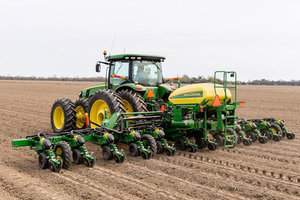A crop expert from the University of Illinois says that despite early planting by growers in the central portion of the state, yields will likely remain consistent with years in the past. Some agricultural producers began planting early, taking advantage of the dry, warm weather.
“While there were reports in 2016 of higher yields from early- compared to late-planted crops, ‘the earlier the better’ typically doesn’t work well when it comes to planting corn or soybeans,” said crop sciences professor Emerson Nafziger. “Yields are usually no higher for crops planted in March or early April compared to those planted in late April or early May, so there’s little reward for taking the risk of very early planting.”
The danger of frost is not a significant threat to early corn or soybean planters, according to Nafziger. However, heavy rainfall soon after planting is now resulting in stand loss for producers. In terms of yield penalties from delayed planting, Nafziger’s research shows that rates are almost the same for both corn and soybeans.
“Our long-held idea of planting corn first and then starting to plant soybean requires rethinking and possible adjustment,” Nafziger said. “One approach is that those with more than one planter might start planting both crops at the same time rather than finishing corn first. If planting is delayed past mid-May, though, then planting corn becomes a higher priority because corn yield declines more quickly than soybean yield when planting is very late.”
The earliest insurable dates for planting corn are April 1, 5, and 10 in southern, central, and northern Illinois. April 15, 20, and 24 are the dates for soybean.
